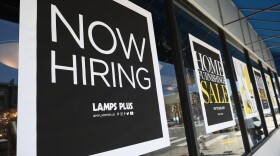
Scott Horsley
Scott Horsley is NPR's Chief Economics Correspondent. He reports on ups and downs in the national economy as well as fault lines between booming and busting communities.
Horsley spent a decade on the White House beat, covering both the Trump and Obama administrations. Before that, he was a San Diego-based business reporter for NPR, covering fast food, gasoline prices, and the California electricity crunch of 2000. He also reported from the Pentagon during the early phases of the wars in Iraq and Afghanistan.
Before joining NPR in 2001, Horsley worked for NPR Member stations in San Diego and Tampa, as well as commercial radio stations in Boston and Concord, New Hampshire. Horsley began his professional career as a production assistant for NPR's Morning Edition.
Horsley earned a bachelor's degree from Harvard University and an MBA from San Diego State University. He lives in Washington, D.C.
-
A larger White House campaign is targeting what it calls anti-competitive behavior in several industries, including meatpacking, in which over 80% of beef goes through just four companies.
-
Consumer prices rose 5.4% in July, compared to a year ago. Here's one thing to watch going forward: How rising wages impacts inflation.
-
As the U.S. economy continues to rebound from the pandemic recession, lots of people are going back to work �� but not as quickly as many employers would like. Employers added 943,00 jobs in June.
-
In an interview with NPR, the Treasury secretary calls to permanently expand the child tax credit being paid out to American families starting this week.
-
Small businesses are struggling to find enough workers to keep pace with booming demand even as data showed 850,000 jobs created in June.
-
The Labor Department says consumer prices jumped 5% for the 12 months ending in May. That's the sharpest increase in nearly 13 years, as the economy rebounds from the pandemic recession.
-
Mississippi, Missouri, Alaska and Iowa are ending the extra $300-a-week unemployment benefit provided as part of COVID-19 relief in a controversial bid to get people back to work.
-
Unpaid electric bills ballooned during the pandemic to more than $27 billion, and many now face the risk of having their power shut off.
-
Banks closed a record number of branches last year as the pandemic pushed more customers to online and mobile banking.
-
Backers of the president's ambitious stimulus plan say it will help struggling families and businesses, but critics say it goes too far.










